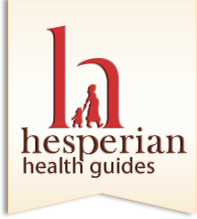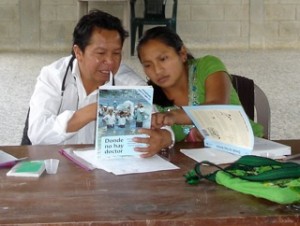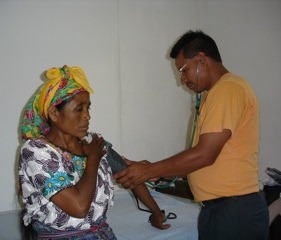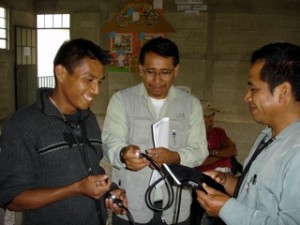Español: Final de la página.
Mateo Nicolás is a teacher by profession, but because there is no village health promoter or midwife in his remote Guatemalan village nor in the village where he works, the villagers would often go to him with their health problems. He felt grossly undereducated when it came to medical issues. He got word that there was going to be a village health promoter training in a nearby village, and he asked if he could attend that training. Casa Colibrí, a grassroots NGO working in the NW region of Guatemala, was presenting the training to a group of 15 health promoters. The topics included taking vital signs, recognizing and treating common illnesses, essential newborn care and newborn resuscitation, and wound care and suturing. Each participant was given a copy of Donde no hay doctor, and they were taught how to use the book through numerous activities and exercises.
Jay Eastman, MD, the doctor in charge of the training, taught how to clean and suture a wound, and the health promoters practiced this skill with sutures and chicken skin. They all agreed that this was a very useful skill and knew that it was going to come in handy in the future.
Several months passed, and Mateo studied his new book with gusto. He used the skills
he learned at the training many times. One afternoon, a young girl was brought to him in his home village of Nuevo Santiago. She had cut herself accidentally while walking, swinging her machete by her side. The wound was large and deep. He quickly referred to the book, reviewing wound care and suturing. He washed his own hands thoroughly, then cleaned the wound carefully, knowing how important this process was for preventing infection. He then methodically stitched up the gaping wound, making a very nice closure. The little girl was stoic and remained still throughout the process. He had no lidocaine to numb the area, so she had to endure the pain of the sutures.
Mateo did an excellent job! He may have saved this child’s life, because where she lives, there is no access to medical care. The nearest medical facility is three hours away by truck, and nobody has transportation. If Mateo hadn’t tended to her wound, it would have become infected.
Mateo is a remarkable person. At five years old, he witnessed the murder of his father, and his mother and siblings fled with the clothes on their backs to Mexico. He lived in a refugee camp his entire childhood, through high school, and then trained to become a teacher. He longed to go back to Guatemala where his ancestors were from. He is 100% indigenous Maya and is dedicated to helping them. Mateo stood out as a true leader. At the village health promoter training, he clearly stood out. He grasped all the information and immediately started helping the other guys. He lost his job as school teacher when the government decided that his village only needed one teacher (there were two), and Casa Colibrí recruited him to work as a village health promoter for us for one year while he was applying to nursing school. He was accepted to the government university in Guatemala, where he is taking a three-year course and will receive his R.N. He will then work at a remote rural clinic we built in the hinterlands of Guatemala. We figure he will be capable of treating 85 percent of the illnesses and medical emergencies that arise. We hope to equip an ambulance or some kind of vehicle for him to use. He will also do prenatal checkups in this vehicle, which will serve as a clinic on wheels.
We have given out many, many copies of Where There Is No Doctor. The recipients are always thrilled to receive it. As one health promoter said, “We have never been given so much as a pencil in the past to help us in our work in the community. This knowledge is more valuable than gold.”
Shared with Hesperian by Linda Eastman, Casa Colibrí, Guatemala
Donde no hay doctor en Guatemala
Mateo Nicolás era maestro en una escuela en Guatemala, pero dado que no había promotores de salud ni parteras en su pueblo, muchas veces la gente lo buscaba para pedirle ayuda con sus problemas de salud. Él se sentía muy deficiente en cuanto a la práctica de la medicina. Cuando le dijeron que iba haber una capacitación para promotores de salud en un pueblo cercano, decidió asistir. La casa Colibrí, una ONG sin fines de lucro estaba trabajando en la región noroeste de Guatemala e iba a presentar una capacitación a un grupo de 15 promotores de salud. Los temas incluían la toma de señas vitales, cómo reconocer y tratar enfermedades comunes, el cuidado de los bebes recién nacidos y cómo dar resucitación a niños pequeños y el cuidado de heridas. Cada participante recibió una copia de Donde no hay doctor y aprendieron a utilizar el libro a través de varias actividades y ejercicios.
Jay Eastman, el doctor a cargo de la capacitación, les enseño cómo limpiar y suturar una herida, y los promotores de salud practicaron con la piel de un pollo. Todos estaban de acuerdo que era una destreza muy útil que iban a utilizar mucho en el futuro. Pasaron los meses y Mateo se la pasaba estudiando su nuevo libro y pudo practicar varias veces lo que había aprendido en la charla. Una tarde, le llego una niña pequeña a su casa en Nuevo Santiago. Ella se había cortado en la mano con un machete. La herida era grande y profunda. Mateo primero se lavo las manos y luego limpio la herida con mucho cuidado, ya que había leído en Donde no hay doctor que el proceso de limpieza era muy importante para prevenir infecciones. Después, comenzó a coser la herida metódicamente, cerrándola correctamente. La niña se mantuvo tranquila durante el proceso, a pesar de que no había lidocaína para adormecer el área.
¡Mateo lo hizo todo muy bien! Si Mateo no hubiera atendido la herida, se le hubiera infectado. Y como no había acceso médico donde ella vivía y la clínica más cercana estaba a 3 horas por camión, es muy probable que sus acciones le salvaron la vida.
Mateo es una persona notable. A los 5 años presenció el asesinato de su padre y su familia tuvo que escapar con todas sus pertenencias a México. Vivió toda su niñez hasta 2do de preparatoria en un campo de refugiados y después se capacitó para ser maestro. Mateo es 100% maya y quería volver a Guatemala, el país de sus ancestros, para dedicarse a ayudar a la comunidad indígena. En la capacitación para promotores de salud, Mateo demostró que era un verdadero líder. Cuando el gobierno lo despidió ya que solo se necesitaba un maestro en el pueblo, y con Mateo eran dos, la Casa Colibrí lo reclutó para trabajar como promotor de salud por un año mientras que metía su solicitud para estudiar enfermería. Fue aceptado a la universidad de Guatemala, de donde se graduará como enfermero en 3 años. Después, el planea trabajar en una clínica rural.
Con el programa Gratis, Hesperian ha podido regalar muchísimas copias de Donde no hay doctor a personas como Mateo, que quieren ayudar a sus comunidades. Las personas que los reciben siempre están muy agradecidas de recibirlo. Como nos dijo un promotor de salud en una carta de agradecimiento: “Nunca habíamos recibido ni siquiera un lápiz para nuestro trabajo en la comunidad. La información en Donde no hay doctor vale más que oro.”
Compartido con Hesperian por Linda Eastman, Casa Colibrí, Guatemala








